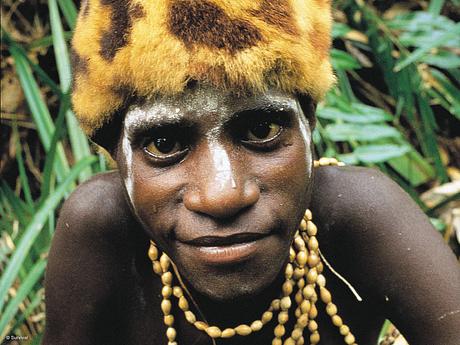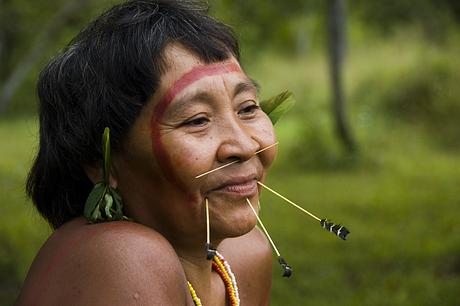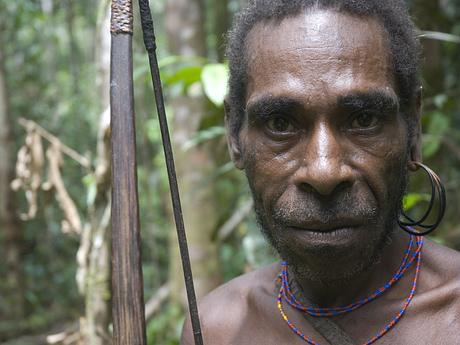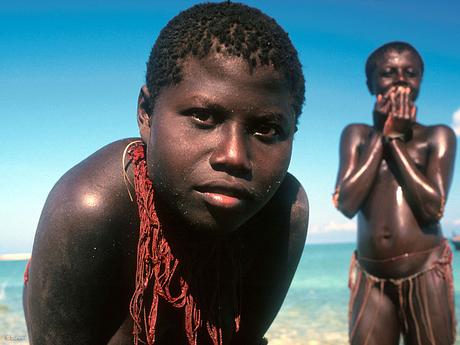Jared Diamond's new book 'The World Until Yesterday' slammed by Survival
January 30, 2013
 © Jeanne Herbert/Survival
© Jeanne Herbert/SurvivalThis page was last updated in 2013 and may contain language which is now outdated.
Tribal rights organization Survival International has launched a vigorous critique of Pulitzer Prize-winner Jared Diamond’s new book ‘The World Until Yesterday: What Can We Learn from Traditional Societies?’, labelling it ‘dangerous nonsense,’ which, if believed, risks ‘pushing the advancement of human rights for tribal peoples back decades.’
In an article published by the US publication Daily Beast entitled ‘Savaging Primitives: Why Jared Diamond’s “The World Until Yesterday” is completely wrong’, Survival’s Director Stephen Corry attacks two of Diamond’s main messages: that today’s tribal peoples are a model of how everyone lived until a few thousand years ago (in a ‘world until yesterday’); and that tribal societies are more violent than industrialized societies.
Diamond argues that tribal peoples (he calls them ‘traditional societies’), while partly modified by contact, are best thought of as living more or less like humankind did until the ‘earliest origins of agriculture around 11,000 years ago in the Fertile Crescent’. But the idea that today’s tribal peoples live anything like humankind’s ancestors has been contested by many scientists. Like all societies, tribal societies change constantly in order to survive, and are just as much part of the 21st Century and ‘modern’ as everyone else.
Diamond argues further that tribal societies are considerably more violent than industrialized societies and that ‘most small-scale societies [are] trapped in… warfare’. His conclusions advocate the imposition of state governments, stating that ‘the biggest advantage of state government is the bringing of peace’.
But Corry questions the validity of Diamond’s data and concludes that the idea that tribal societies are more violent than industrialized ones is ‘dangerous nonsense’, and his conclusions akin to colonial ideas of ‘pacifying savages’.

Not only is Diamond’s argument based heavily on the work of a few anthropologists such as the widely discredited Napoleon Chagnon, it is the imposition of nation states which kills, rather than saves, tribal peoples. While most of Diamond’s research findings stem from his time in New Guinea, he ignores, for example, that the Indonesian invasion and occupation of the Western part of the island (by the Indonesian state government) has been responsible for an estimated 100,000 killings of Papuan tribal people.
While Diamond does not label tribal peoples ‘primitive’ or ‘savages’, some of his reviewers do. The British Sunday Times and American Wall Street Journal happily talk about what can be learnt from ‘primitive’ tribes and Germany’s popular Stern magazine splashed ‘savages’ in large letters over its pages when describing the book.
Stephen Corry writes, ‘The principal cause of the destruction of tribal peoples is the imposition of nation states. This does not save them; it kills them. Were those of Diamond’s persuasion to be widely believed, they risk pushing the advancement of human rights for tribal peoples back decades. Yesterday’s world repeated tomorrow? I hope not.’
Read a reaction by Papuan leaders
Read more about why Jared Diamond is wrong
Note to editors
- Napoleon Chagnon’s ethnography ‘Yanomamö: The Fierce People’ argues that the Yanomami are ‘sly, aggressive, and intimidating’ and engaged in ‘chronic warfare’. This has been widely discredited.
- Stephen Corry, Director of Survival International and author of ‘Tribal peoples for tomorrow’s world’, is available for interview.




